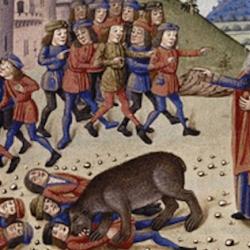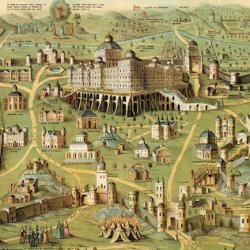INTRODUCTION
Manasseh undergoes a demonic “repentance”: Verse 3 says “he turned, he built,” using the Hebrew verb that normally designates repentance (“turn”). He “repents” of Hezekiah’s reforms. Because of this, the Lord determines to repeat in Jerusalem what he did in Shiloh (v. 12; cf. 1 Samuel 3:11; Jeremiah 19:3). He will bring a judgment that will reverberate throughout the world.
THE TEXT
“Manasseh was twelve years old when he became king, and he reigned fifty-five years in Jerusalem. His mother’s name was Hephzibah. And he did evil in the sight of the LORD, according to the abominations of the nations whom the LORD had cast out before the children of Israel . . . .” (2 Kings 21:1-26).
MANASSEH, A NEW SOLOMON
Hezekiah is a new David, and his successor Manasseh is like an idolatrous Solomon on steroids. In this scheme, Josiah is an inverted Jeroboam, reuniting the kingdom and destroying the calf shrine at Bethel. Manasseh, like Solomon, is a great builder (vv. 3-5), who “makes” things (vv. 3, 7). Both Solomon and Manasseh build high places (1 Kings 11:7; 2 Kings 21:3). Verse 7 alludes specifically to the promise made to Solomon, the first mention of Solomon since the end of his reign. Solomon’s idolatries were punished with a division of the kingdom; the effects of Manasseh’s will be more drastic – exile.
A SOUTHERN AHAB
The sequence from Omri-Ahab is also a variation on the David-Solomon sequence, so it’s not surprising that Manasseh is described as a new Ahab. Ahab is already a counterfeit Solomon, and Manasseh is the same in Judah. Live like Ahab, die like Ahab: According to verse 13, Manasseh will be suffer the same judgment as Samaria. Verse 11 mentions the Amorites, the only reference to Amorites other than 1 Kings 21:26. Ahab not only pursued idolatry, but killed prophets who opposed him and faithful Israelites like Naboth. Manasseh fills the city with blood, showing again the inner connection between idolatry and murder that Kings highlights.
No incidents are recorded in Manasseh’s reign. Nothing happens. There is only idolatry. Manasseh commits “abominations” (v. 2, 11), a word that refers to defilements of the land that cause the land to expel the inhabitants. Verse 3 gives a catalogue of specific sins, moving from the high places, which are distant from the temple (v. 5) to the temple itself (v. 7). As the abominations draw nearer to Yahweh’s face, His anger intensifies. There is also a progression from violations of the first commandment, to the second, and to the third. Verse 4 describes offenses against the “name,” and this is repeated in verse 7. Both the second and third commandments have threats attached, and those threats will be carried out against Judah.
PROPHETS TO JUDAH
In the days of the original Ahab, Yahweh sent prophets to call the king to repentance, and He mercifully does the same with Manasseh (v. 10). Like Israel, Judah will have chances to turn, and will ultimately be judged for stiff-necked resistance to the prophets. The prophets defend the justice of God’s actions: Judah did “evil” and so the Lord brings “evil” on her (v. 12). After Manasseh, there is no way for Judah to escape judgment – not even Josiah (cf. 2 Kings 23:26-27). The law is incapable of turning Judah around.















